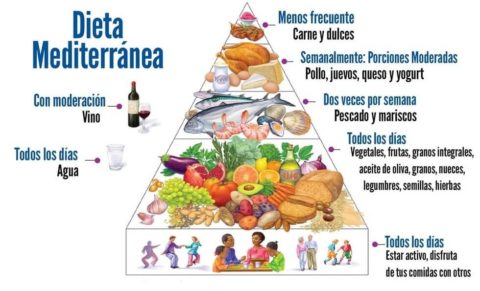
What is the Mediterranean diet?
The Mediterranean diet is the typical nutritional system of the populations that, until the 50s, colonized the Mediterranean basin.
Starting from the second post-war period, the economic boom that has swept these regions has led to the progressive abandonment of this ancient style of food, in favor of a diet richer in animal fats and proteins.
In more recent times, this dietary style has been re-evaluated, even if in its practical application it is too often contaminated and distorted by the globalization process. Consequently, most of the peoples concerned do not seem to comply satisfactorily with the dictates of the Mediterranean diet.
As anticipated, for some decades now the Mediterranean diet has been decidedly re-evaluated, so much so that today it agrees in many respects with the indications provided by the most modern food pyramids.
The Mediterranean diet is recommended because:
- Ensures an adequate supply of nutrients;
- It is based on natural, little processed foods;
- It reduces the risk for "diseases of well-being", that is, of all those diseases, such as type II diabetes, obesity and cardiovascular problems, linked to the unbalanced eating style typical of Western countries.
Alimony
What are the typical foods of the Mediterranean diet?
The basic foods of the Mediterranean diet are:
- Fresh vegetables (seasonal).
- Whole grains.
- Leguminous plants.
- Fresh fruit (seasonal).
- Fishery products, which must be fresh, mainly small in size and composed almost exclusively of blue fish (seasonal).
They are quantitatively less important:
- Meat, which must be predominantly white (avian and rabbit).
- Fresh milk and yogurt.
Following:
- Potatoes.
- Ricotta and cheeses.
- Meat of large animals (red, especially sheep, goat and game).
- Egg.
- Red wine.
- Extra virgin olive oil.
- Oil seeds (seasonal).
- Herbs.
Health
Mediterranean diet and health effects
Food choices inspired by the principles of the Mediterranean diet make it possible to prevent numerous diseases. In particular, this diet has a valuable protective effect on cardiovascular diseases, since:
- It has few saturated fats (the excess of which increases LDL cholesterol levels and with them the atherosclerotic risk).
- It has little cholesterol.
- It is rich in dietary fibers, which reduce the intestinal absorption of lipids and modulate that of carbohydrates, reducing the glycemic-insulin surge.
- It is rich in oleic acid, which lowers LDL cholesterol without affecting HDL.
- It is rich in essential omega 6 and omega 3 fatty acids, which fight hypertension, hypercholesterolemia, hypertriglyceridemia, thrombosis, etc.
- It is rich in antioxidants of any kind: vitamins, minerals, polyphenols, etc.
- Contains only natural sodium from foods.
Furthermore, the Mediterranean diet reduces the risk of developing type II diabetes mellitus because:
- Being rich in dietary fiber, it decreases the intestinal absorption rate of sugars, preventing the glycemic-insulin peaks typical of contemporary Western nutrition.
- It is rich in starch and fructose: which have a glycemic-insulin index lower than that of glucose and sucrose.
- It is less caloric than the contemporary Western diet and, since type II diabetes is frequently associated with obesity, it is particularly indicated both in prevention and in association with pharmacological treatment.
The Mediterranean diet reduces the risk of hypertension, hypertriglyceridemia and hypercholesterolemia; to exert these effects are:
- Essential omega 3 fats, which reduce hypertension and hypertriglyceridemia.
- Essential omega 6 and non-essential omega 9 fats, which reduce cholesterolemia.
- Legume lecithins, which reduce cholesterolemia.
- Phytosterols, which reduce cholesterol.
- Antioxidants, which reduce cholesterol and various metabolic complications.
The Mediterranean diet also reduces the risk of obesity, since:
- As we just said, it is less caloric.
- Thanks to the fibers and the type of carbohydrates contained in it, it has a glycemic-insulin index referred to both food and meals, of a moderate type.
- In addition, the fibers promote the sense of satiety; it also contains a lot of water, which promotes gastric fullness, especially in association with fibers.
- It is rich in aromatic herbs that help reduce the use of fatty condiments to flavor dishes.
The Mediterranean diet reduces the general cardiovascular risk:
- It prevents and treats metabolic diseases (hypertension, type 2 diabetes mellitus, hypercholesterolemia and hypertriglyceridemia).
- It prevents and treats obesity.
- It is rich in anti-inflammatory and blood-thinning omega 3s.
Finally, the Mediterranean diet prevents the appearance of various cancers, since
- It contains few toxic-carcinogenic molecules, instead typical of junk foods produced by fast-food restaurants. The meat of the Mediterranean diet is traditionally cooked roast, but the frequency of consumption is so low that it is harmless.
- It has few saturated fats and a lot of fiber (preventive effect on the development of colon / rectal, stomach and breast cancer).
- It is rich in anti-radical antioxidants, which have a documented preventive effect on prostate cancer and other types of cancers.
Therefore, even if it does not work miracles, an eating style inspired by the principles of the Mediterranean diet is able to reduce the risk of developing numerous diseases.
Recipes
Examples of recipes in line with the rules of the Mediterranean diet
Pasta alla Puttanesca
Problems with playing the video? Reload the video from youtube.
- Go to the Video Page
- Go to the Video Recipes Section
- Watch the video on youtube
Pasta of health
Anchovies in Beccafico
Bruschetta Sfiziose Tomato and Mozzarella
Lentils: how to cook them with low fat
Pasta e Fagiooli


























